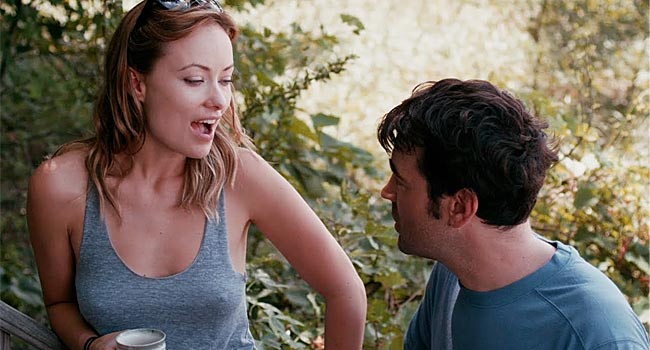
Rest assured that the only thing Swanberg changes from his previous work is how many people will see the film. And that is a good thing.

Rest assured that the only thing Swanberg changes from his previous work is how many people will see the film. And that is a good thing.
Joe Swanberg is a well-known independent director who is notorious for his no budget, no script approach to filmmaking. The results tend to be very personal (he acts in most of his films) and highly realistic since the actors are not confined to reading lines off a script. Drinking Buddies is somewhat of a crossover from micro-indie films into a larger budget film for Joe Swanberg; it contains a well-known cast (Olivia Wilde, Jake Johnson, Anna Kendrick) and much higher production values (having a dedicated director of photography, etc.) than his previous 14 films. The Duplass brothers proved it is possible to make a big budget film still feel small and intimate a few years back with Cyrus, Swanberg solidifies the transition can be achieved with Drinking Buddies.
Kate (Olivia Wilde) and Luke (Jake Johnson) are co-workers at a craft brewery in Chicago who get along with each other well enough that at times it would be easy to mistake them as a couple. However, they both are in existing relationships despite their personalities being much more aligned with each other than the ones that they are actually dating. In both cases, their significant others are much more grounded and would prefer to settle down. Luke has been dating Jill (Anna Kendrick) for long enough that the marriage conversation has already been brought up, though nothing has been finalized. Kate has only been seeing Chris (Ron Livingston) a short while and their relationship seems more sexually based than anything.
Blink and you will miss the conversation where the two couples agree to a weekend retreat at a lakeside cabin. Almost immediately after they arrive, the cabin acts like a pressure cooker for each of the relationships, creating drama when they divide after Kate and Luke opt to play drinking games together while their significant others both prefer to hike through the woods. So in case you did not catch the subtle hints in the beginning, the time at the cabin makes it completely obvious that the two couples seem much more comfortable with the opposite significant other. For the first time the couples are realizing the gravity of the situation as well. Sexual tensions begin to boil, yielding the perfect recipe for a relationship explosion.

The best part about Drinking Buddies is how well the unspoken tension and jealously of circumstances are articulated without directly announcing them. This means through body language and situational awareness you get a sense of what the characters are thinking without them having to verbally say it. For example, it is evident that Luke gets jealous after he gets injured while helping Kate move into her new place when she is forced to have another guy come help with the move. His first reaction is to call her out on it, but you can tell his head is spinning as he realizes there is no justification for him to do so because of his relationship with Jill.
One major element that Swanberg re-uses from his early Mumblecore films is working with a vague outline versus a detailed script. He puts a lot of trust in his cast to improvise much of the dialog in any given scene to provide a natural feeling environment. The gamble pays off in spades when the loose script works as well as it does in Drinking Buddies. The performances for some (Wilde in particular) end up being some of the best to date. Chemistry between Johnson and Wilde appears effortless, as if they have been close friends for years. Kendrick and Livingston provide the right about of counterbalance to make the equation work.
A common mistake for a film to make that is based on improvised dialog is allowing scenes to drag on and get off topic. Thankfully, this is not the case in Drinking Buddies, which is comprised of a light and breezy pace due to the magnificently concise editing. What was most gratifying about Drinking Buddies was the portrayal of emotion and inclination without coming right out and talking about them. Some people feared that a more accessible film would diminish the passion and genuine feel that often are associated with Swanberg’s work, but rest assured that the only thing he changes is how many people will see the film.